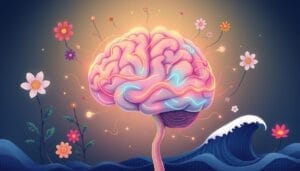Most parents notice when their child is upset or anxious. But very few realize how deeply it can affect their child’s growing brain. How stress affects brain development in children is not just a topic for science journals. It’s something every parent, teacher, and caregiver should understand and act on.
In this blog, we will explore the real science behind stress and how stress affects brain development in children. We’ll cover what causes stress, how it changes the brain’s structure, and what you can do to prevent lifelong damage.
Table of Contents
ToggleUnderstanding Stress in Children
Stress doesn’t just show up in adulthood. Children feel it too, often with more lasting impact.
What is Stress? (Childhood Definition vs. Adult Stress)
Stress is the body’s natural response to any perceived threat or challenge.
Children experience stress differently than adults. For kids, stress can come from changes in routine, emotional trauma, or fear. It’s not about work deadlines; it’s about safety, connection, and stability.
There are two main types:
- Acute stress: A sudden event (e.g., moving homes, failing a test).
- Chronic stress: Ongoing issues like neglect, family conflict, or bullying.
Unlike adults, kids have a developing brain. So the way they handle stress is different and often more harmful. Their stress response system is still immature, which means repeated stress hits harder.
What Triggers Stress in Children?
Children don’t need major trauma to feel stress. Here are everyday situations that can leave a lasting impact:
- Family conflict, divorce, or abuse
- Poverty or unstable living situations
- Bullying or peer pressure at school
- Academic overload and fear of failure
- Exposure to violence (real or online)
- Neglect or emotional disconnection
- Adverse childhood experiences (ACEs), such as abuse, neglect, or household dysfunction
These experiences can trigger the body’s stress response, which includes the release of cortisol, a hormone that, when elevated for too long, can negatively influence brain development.
Statistics on Childhood Stress
Let’s look at the numbers:
| Organization | Key Insight |
|---|---|
| CDC | 1 in 3 children face serious stress before age 12 |
| WHO | Over 275 million children worldwide live in conflict zones |
| APA | 42% of children report that they are stressed, but only 14% of parents think so |
These stats clearly tell us that kids are under more stress than adults realize.
Brain Development in Children

Children’s brains grow rapidly from birth to age five and again during puberty. These are called sensitive periods, and what happens during these stages can set a lifetime trajectory.
By age five, nearly 90% of the brain is already developed. During this time, brain architecture is shaped by the child’s experiences. The early years are crucial for developing memory, attention span, emotional regulation, and reasoning.
- Infancy to age 5: Basic brain wiring occurs.
- Ages 10-18: The brain refines emotional control and decision-making.
Any stress during these times can deeply affect early brain development.
Neuroplasticity
The brain’s ability to adapt and rewire itself, called neuroplasticity, is highest during childhood. This flexibility can be both a strength and a vulnerability. If children are raised in nurturing environments, their brains develop healthily. However, if they are exposed to prolonged stress, the same neuroplasticity can lead to the development of maladaptive neural pathways.
How Stress Affects Brain Development in Children?
Here’s the basic science:
- Cortisol is the body’s stress hormone.
- The HPA axis (hypothalamic-pituitary-adrenal) controls how we react to stress.
- In small amounts, cortisol helps, but too much for too long is toxic.
When stress becomes frequent, it changes how the brain grows. This is known as toxic stress, a term coined by the Harvard Center on the Developing Child. Toxic stress affects how neurons connect. and in children, this process is still wide open.

Brain Areas Affected by Chronic Stress
Stress doesn’t hit the whole brain equally. It targets specific regions:
- Prefrontal Cortex
- Function: Planning, decision-making, focus
- Under stress: Shrinks and becomes less active
- Amygdala
- Function: Emotional regulation, fear response
- Under stress: Becomes overactive, leading to anxiety or aggression
- Hippocampus
- Function: Learning, memory storage
- Under stress: Damaged, resulting in forgetfulness or learning difficulties
These changes are at the root of many learning and behavior problems in school.
Cognitive, Emotional & Behavioral Impacts
Stress doesn’t just sit in the background. It changes how kids think, feel, and behave:
- Poor focus or attention span
- Trouble managing emotions (anger, sadness)
- Lower academic scores
- Higher chances of anxiety and depression
- Behavior issues like defiance or withdrawal
These are the effects of stress on kids’ mental health, and they can show up early — even in kindergarten.

Long-Term Effects of Stress in Children
Unchecked, childhood stress can shape a person’s adult life.
Mental Health Disorders Linked to Childhood Stress
Children under long-term stress are more likely to face:
- Mental health disorders like PTSD, ADHD, or depression
- Panic attacks, anxiety
- Depression and suicidal thoughts
- Drug or alcohol use in teenage years
The neurodevelopmental impact of stress often becomes clearer in late teens or early adulthood.
Physical Health Implications
Stress doesn’t stop at the brain. It affects the body, too:
- Weak immune systems (frequent illness)
- Higher chances of obesity or heart disease
- Poor sleep or sleep disorders
- Inflammation and chronic fatigue
Even cortisol levels in kids can remain high into adulthood if not managed early.
Educational and Social Impact
Stressed kids may struggle in the classroom and with peers:
- Increased risk of school dropouts
- Low self-esteem
- Difficulty forming healthy friendships
- Delayed emotional maturity
This is where childhood stress and brain development connect directly to life outcomes.
Environmental and Genetic Factors
The Role of Family Environment

Children raised in chaotic households with high levels of conflict are more likely to experience stress-related brain changes. Conversely, nurturing and predictable environments act as a buffer.
Socioeconomic Impact
Research shows that children from low-income households are more susceptible to chronic stress. Economic hardship, food insecurity, and lack of safe housing can elevate stress hormones and hinder healthy brain development.
Genetic Sensitivity
Some children are genetically predisposed to be more sensitive to stress. Known as the “orchid-dandelion” theory, it suggests that some children (orchids) are more affected by both negative and positive environments than others (dandelions).
Protective Factors and Solutions
The brain isn’t fixed — and even under stress, it can heal. Here’s how.
Building Resilience in Children
Resilience helps the brain recover. It’s built through:
- Having at least one stable, supportive adult
- Consistent affection and validation
- Routines that make life predictable
- Safe spaces for emotional expression
The science is clear: resilience in childhood can buffer even severe trauma.
Mindfulness, Play, and Emotional Expression
Let children play, breathe, and talk:
- Mindfulness techniques (like belly breathing)
- Play therapy: Allows safe expression of scary feelings
- Drawing, storytelling, or music for release
This is especially helpful for kids who’ve faced emotional trauma in children.
Role of Parents and Educators
Adults can’t remove all stress — but they can change how it’s managed:
- Watch for warning signs like withdrawal or aggression
- Keep routines regular — bedtime, meals, screen time
- Use calm voices and active listening
- Talk openly about emotions
This is the heart of trauma-informed parenting.
Professional Support and Therapy
Know when to ask for help:
- If stress lasts more than 2 weeks
- If the child’s behavior has changed drastically
- If physical symptoms (headaches, stomachaches) appear often
Effective tools include:
- Cognitive Behavioral Therapy (CBT)
- Play therapy
- Trauma-focused care with pediatric psychologists
What Dr. Chugh Wants Every Parent to Know?
If your child seems stressed, don’t wait. Early stress changes the brain, but with the right support, it can heal. Emotional safety, routine, and expert help are your best tools.
If you’re concerned about how stress affects brain development in children, schedule a consultation with me, Dr. Chandril Chugh, today.
Your child’s brain is growing fast, let’s make sure it’s growing in the right direction.
Frequently Asked Questions (FAQs)
What is the impact of stress on brain development in children?
Stress affects brain development by altering brain structure and function. It impacts emotional regulation, memory, and decision-making.
How is stress defined in children?
Stress in children is a biological response to threats or challenges, which includes the release of cortisol and other stress hormones.
What are the critical stages of brain development?
The most critical brain development occurs from birth to age five, during which 90% of the brain is formed.
How does chronic stress affect brain structure?
It causes enlargement of the amygdala, shrinking of the hippocampus, and reduced functionality of the prefrontal cortex.
What are the cognitive impacts of stress?
Children may experience memory issues, poor attention span, and difficulty with learning and problem-solving.
Can stress permanently damage a child’s brain?
Yes, especially if it’s chronic stress in children during sensitive brain development periods. But early intervention can reverse some effects. Book a consultation with Dr. Chugh to assess your child’s brain health.
What is cortisol’s role in stress?
Cortisol helps manage acute stress, but prolonged exposure damages the brain and affects health.
What environmental factors cause stress?
Poverty, domestic violence, neglect, or household instability are common contributors.
Do genetics play a role in stress sensitivity?
Yes, certain genes make children more vulnerable or resilient to stress, influencing how their brain responds.
What helps reduce stress in children?
Strong adult support, structured routines, coping strategies, and professional help can significantly reduce the impact.
About The Author

Medically reviewed by Dr. Chandril Chugh, MD, DM (Neurology)
Board-Certified Neurologist
Dr. Chandril Chugh is a U.S.-trained, board-certified neurologist with expertise in diagnosing and managing neurological disorders, including migraines, epilepsy, Parkinson’s disease, and movement disorders. His clinical focus includes evidence-based neurological care and patient education.
All content is reviewed for medical accuracy and aligned with current neurological guidelines.




